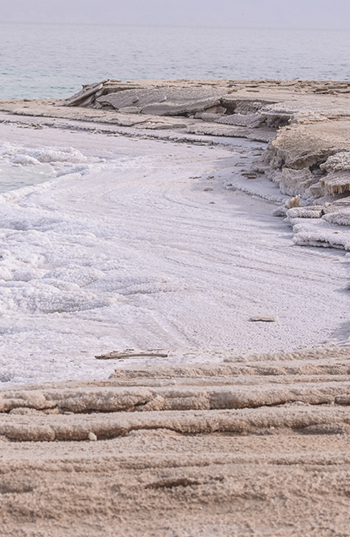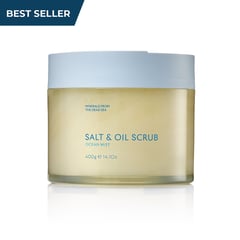
Magnesium plays a pivotal role in supporting a myriad of biological functions within the human body, including muscle and nerve functions, regulating blood pressure, and bolstering the immune system. Two of the most common forms of magnesium in consumer health products are magnesium sulfate and magnesium chloride. This article delves into the properties, benefits, and applications of both compounds, with a focus on their use in bath salts, concluding with a detailed explanation of why Dead Sea salt, which contains magnesium chloride, is superior for bath salts.

What Is Magnesium Sulfate?
Commonly known as Epsom salt, magnesium sulfate is a chemical compound that includes magnesium, sulfur, and oxygen. It is famed for its application in bath salts and for therapeutic purposes such as alleviating muscle soreness, easing pain and cramps, and assisting in the detoxification of the body. Its high solubility in water makes it an ideal component in baths, allowing the body to absorb magnesium through the skin, purportedly delivering its benefits directly to the tissues.
What Are The Benefits of Magnesium Sulfate?
Relaxation and Stress Relief
Soaking in a bath enriched with Epsom salt can help to relax muscles and relieve stress.
Pain and Cramp Relief
It is believed that Epsom salt baths can reduce physical pain and alleviate muscle cramps.
Detoxification
Epsom salt baths are popular for their detoxifying properties, which are believed to flush toxins and heavy metals from the cells.
What Are The Applications of Magnesium Sulfate?
Bath Salts
Epsom salt is predominantly used in bath salts for its soothing properties.
Gardening
It is also used to correct magnesium deficiencies in soil.
Health Treatments
Occasionally, it helps as a laxative or to reduce swelling.
What Is Magnesium Chloride?
Magnesium chloride consists of magnesium and chloride, an essential electrolyte. This form of magnesium is notable for its enhanced bioavailability compared to magnesium sulfate, making it a preferred choice in dietary supplements, medications, and topical solutions like lotions and sprays. Its excellent solubility and efficacy in transdermal (through the skin) absorption make it a strong candidate for bath applications.
This raises a common question: Which is better for bath, magnesium chloride vs magnesium sulfate? Read on to explore the differences.
What Are The Benefits of Magnesium Chloride?
Improved Magnesium Absorption
Magnesium chloride is absorbed better and more fully utilized by the body.
General Health Benefits
Adequate magnesium levels can improve cardiovascular health, aid digestion, and enhance mood.
Skin Health
Topical applications of magnesium chloride can hydrate and improve skin health.
What Are The Applications of Magnesium Chloride?
Dietary Supplements
It is commonly used in oral supplements for magnesium replenishment.
Medical Uses
Magnesium chloride is used in medical settings for managing low magnesium levels, eclampsia, and several other conditions.
Cosmetic Products
Its stability and solubility make it suitable for skincare products.
How Does Magnesium Sulfate Compare to Magnesium Chloride?
When comparing magnesium sulfate vs magnesium chloride, it’s important to consider both absorption and intended benefits. While both compounds are beneficial, their differences in bioavailability and physiological impacts are significant. Magnesium chloride’s superior absorption and retention in the body make it more effective for long-term health benefits. Conversely, magnesium sulfate is more suitable for temporary relief from ailments like sore muscles or constipation due to its less efficient absorption.
Understanding the difference between magnesium sulfate and magnesium chloride helps in choosing the right compound based on your wellness goals.
Why Is Dead Sea Salt Considered Superior in Bath Salts?
Dead Sea salt, predominantly composed of magnesium chloride, is renowned for its rich mineral content and therapeutic benefits. Sourced from the Dead Sea, where the mineral concentration is much higher than in other seas, it offers unique advantages:
Rich Mineral Content
Dead Sea salt contains a high concentration of various beneficial minerals, including potassium, calcium, and bromides, in addition to magnesium chloride. These minerals are in ionic forms, enhancing their absorption through the skin.
What Are Its Therapeutic Benefits?
Detoxification and Hydration
Dead Sea salts help detoxify the skin by drawing out impurities and hydrating it, which is beneficial for skin conditions like eczema and psoriasis.
Muscle Relaxation
The high magnesium content helps relax muscle stiffness and alleviate pain.
Improved Skin Health
Regular use can lead to smoother, clearer skin by balancing skin moisture and improving its overall appearance.
Purity and Natural Sourcing
Dead Sea salts are minimally processed, retaining a high level of their natural mineral benefits. This purity, combined with the unique environmental conditions of the Dead Sea, enhances their effectiveness in bath salts.
Conclusion
Both magnesium sulfate and magnesium chloride offer significant health benefits, particularly when used in bath salts. However, the superior mineral content and bioavailability of magnesium chloride, especially as found in Dead Sea salt, make it a more effective choice.
Regardless of whether you're deciding between magnesium sulfate vs magnesium chloride for general wellness, or evaluating magnesium chloride vs magnesium sulfate for bath use, consider your needs.
Integrating Dead Sea salt into your bathing routine not only promotes relaxation and muscle relief but also provides substantial improvements in skin and overall well-being.
FAQs
-
What is the difference between magnesium sulfate and magnesium chloride?
The main difference between magnesium sulfate and magnesium chloride lies in their absorption and usage. Magnesium chloride has higher bioavailability, meaning the body absorbs and retains it more effectively. Magnesium sulfate is better suited for short-term relief, such as muscle soreness or constipation.
-
Which is better for bath use: magnesium chloride or magnesium sulfate?
When it comes to magnesium chloride vs magnesium sulfate for bath purposes, magnesium chloride is generally considered more effective due to its superior absorption and longer-lasting effects on the body. Magnesium sulfate, while still beneficial, provides more temporary relief.
-
Can I use both magnesium sulfate and magnesium chloride in my bath?
Yes, you can use both, but it’s best to choose one based on your goal. Magnesium sulfate (Epsom salt) is helpful for relaxation and short-term detox. For skin health and deeper mineral replenishment, magnesium chloride, like what’s found in Dead Sea salt, is ideal.
-
Is Dead Sea salt better than Epsom salt for skin conditions?
Yes. Dead Sea salt, which is rich in magnesium chloride and other minerals, is often more effective for skin conditions like eczema or psoriasis due to its hydrating and detoxifying properties.
-
How often should I use magnesium salts in my bath?
You can safely use magnesium bath salts 2–3 times a week. If using for a specific health condition, it’s best to consult a healthcare professional for personalized guidance.

